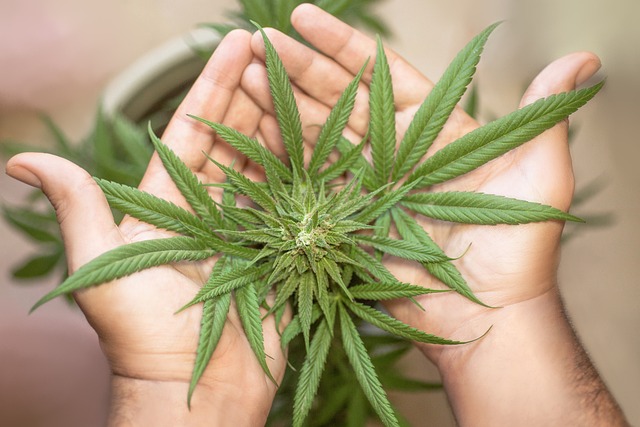Kentucky has recently legalized THCA (Tetrahydrocannabinolic Acid), a non-psychoactive cannabinoid found in the Cannabis sativa plant, offering residents new opportunities to explore its potential health benefits. As local farmers begin cultivating THCA flowers to meet this demand, it's important for consumers to purchase these from state-licensed dispensaries to ensure safety and quality. Proper storage under cool, dark conditions is necessary to maintain the potency of THCA products. For those unfamiliar with THCA, it's essential to approach its use cautiously due to its strong effects and to be aware that it can convert into psychoactive THC upon consumption. With the legalization of THCA in Kentucky, users must stay informed about state laws on cannabis possession and usage. Education on the differences between THCA and THC is vital for responsible use, and staying updated on legal changes will help navigate this evolving market safely. As THCA is now legal in Kentucky, it's under scrutiny for its therapeutic potential, including anti-inflammatory, anti-nausea, and neuroprotective properties, making it a subject of interest for those exploring cannabinoids for health purposes. Both consumers and healthcare professionals should pay close attention to the research and legal developments surrounding THCA as this market matures.
With Kentucky’s recent steps toward cannabis reform and the legalization of hemp-derived THCA, residents now have a new wellness landscape to explore. This article serves as a comprehensive guide for those interested in understanding and utilizing THCA flower tips within the state’s regulations. From its potential benefits and effects to practical advice on storage, consumption, and legal considerations, we delve into the intricacies of THCA in Kentucky’s burgeoning hemp industry. Discover how to source high-quality THCA flower, activate it through decarboxylation, and create homemade edibles or topicals for relief. As the legal framework evolves, this guide provides valuable insights for responsibly embracing THCA flower, whether for personal use or as part of Kentucky’s agricultural evolution.
- THCA Flower Tips for Kentucky Residents Post-Legalization
- Understanding THCA: Potential Benefits and Effects
THCA Flower Tips for Kentucky Residents Post-Legalization

In the wake of Kentucky’s legislative changes that have made THCA (Tetrahydrocannabinolic Acid) legal within its borders, residents now have access to a variety of cannabis products that offer potential health benefits. For those looking to explore the world of THCA flowers, it’s crucial to understand how to handle and consume these products responsibly. Kentucky’s unique climate can affect the growth and potency of THCA flowers, so local cultivation techniques are key. Residents should consider sourcing from state-licensed dispensaries to ensure quality and safety. Proper storage, in a cool, dark place, will preserve the integrity of the THCA flowers, maintaining their potency. When preparing for consumption, it’s important to adhere to safe usage guidelines, as THCA, like other cannabinoids, can have pronounced effects. Dosing should be approached with caution, and new users should start with small amounts to gauge their individual response. As with any new wellness practice, it’s always recommended to consult with a healthcare professional before incorporating THCA flowers into your routine, especially given the evolving legal landscape and personal health considerations.
Understanding the nuances of THCA legality in Kentucky is essential for anyone interested in this cannabinoid. While THCA itself is legal, its conversion to THC when smoked or vaporized must be considered within the context of state law. Residents should familiarize themselves with the specific laws that govern the possession and consumption of these products. Education on the differences between THCA and its psychoactive counterpart, THC, is also important for users to make informed decisions. Additionally, as Kentucky’s regulations around cannabis continue to evolve, staying updated on legal changes will ensure compliance and safety for all residents partaking in THCA products. Engaging with local communities and knowledgeable professionals can provide valuable insights into the best practices for using THCA flowers effectively and responsibly.
Understanding THCA: Potential Benefits and Effects

THCA, or Tetrahydrocannabinolic Acid, is a natural cannabinoid found in the Cannabis sativa plant. While often overshadowed by its decarboxylated form, THC (tetrahydrocannabinol), THCA has garnered attention for its potential health benefits and distinct effects. In states where cannabis is legal, including Kentucky under certain conditions regarding the legality of THCA flowers, enthusiasts and researchers are exploring the properties of THCA. Preliminary studies suggest that THCA may have anti-inflammatory, anti-nausea, anti-emetic (against nausea and vomiting), and neuroprotective qualities. Unlike its psychoactive counterpart THC, THCA is not intoxicating, making it a preferred option for those seeking the therapeutic effects of cannabinoids without the high. The potential effects of THCA are subject to ongoing research, with early findings indicating that it may contribute to pain relief, stress reduction, and improved sleep quality. As legal landscapes evolve, understanding the nuances between different cannabinoids like THCA becomes increasingly important for consumers, healthcare providers, and policymakers alike in states like Kentucky.
Kentucky residents now have a new understanding of THCA, its potential benefits, and effects following legalization. As cannabis legislation evolves, residents can explore this non-psychoactive compound with confidence. By adhering to the recommended THCA flower tips tailored for the region, users can optimize their experience responsibly. This article has shed light on the nuances of THCA, emphasizing its legal status in Kentucky and providing guidance for those looking to incorporate it into their wellness routines. With this knowledge at hand, consumers are now better equipped to make informed decisions about incorporating THCA into their lives within the confines of the law.
